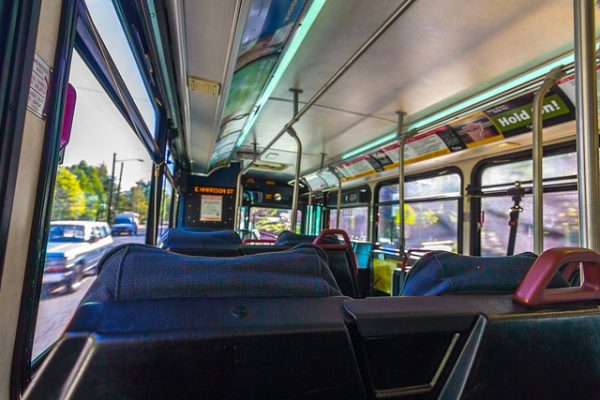In Praise of the Bus

Photo credit: Nikky, CC BY 2.0.
I love when a new batch of Real Life essays shows up in my Feedly; their themed issues are excellent at broadening or changing my perspective on some aspect of life or technology.
However, I kind of want to change their perspective on this week’s essay about public transportation. David A. Banks’ Uber Alles looks at how the Uber Pool and Lyft Shuttle will capitalize on people’s “distaste for buses:”
Under the auspices of app-driven convenience, city bus service can be reborn under new names, reoriented toward the goal of profit rather than equal access.
I am well aware that Uber and Lyft’s fixed-route rides will cater to the population that can afford them, and that — as the article notes — this isn’t the first time that we’ve tried to create buses that not everyone can ride. (Last month Fortune ran an article titled “Apple and Google Are Rerouting Their Employee Buses as Attacks Resume,” noting that people have been breaking windows and throwing rocks at these private buses for four years.)
But here’s the part of the essay where I want to push back:
The bus is an afterthought, a mark of shame precisely because it is neither a status symbol like the car nor a truly shared form of transportation as the streetcar had been.
A mark of shame? I’ve used buses as a primary method of transportation in Minneapolis, Washington DC, Los Angeles, Vancouver, Hyderabad, Seattle, and now Cedar Rapids and I’ve never thought they were shameful. Yes, the routes are sometimes frustratingly long. Yes, the bus might smell like body odor or wet coats. Yes, I was occasionally sexually harassed by other riders (interestingly, this only happened in Minneapolis, Los Angeles, and Hyderabad; riders in DC, Vancouver, Seattle, and Cedar Rapids keep to themselves).
But the bus has always represented freedom, in a way that my car — when I owned a car — never did. I had to take care of my car, constantly monitoring everything from the gas level to the other drivers on the road. The bus lets me relax; I can listen to podcasts, let my mind wander, stare out the window. The bus takes care of me.
I’m not so loyal to buses that I won’t take a Lyft/Uber if the route is too inconvenient, but city buses have been part of my entire adult life and I’m very grateful for them.
Now that I have sung the praises of public transportation, it’s time to re-read this essay and spend more time thinking about the way different forms of transportation segregate riders and indirectly promote racism — because I know that if I only focus on the ways buses have benefited me, I will have missed the point:
Exactly how the new symbology of status takes shape — does driving your own car have more or less status than having a robot driver? — is inconsequential to the overall effect: the maintenance and exploitation of race- and class-based hierarchies for profit.
[…]
Physical segregation is a prerequisite for administering poverty to racial minorities in such a way that it is easily ignorable by white society. The sorting power of algorithmic transit will drive this phenomenon further, not hedge it.
If you want to read the essay as well, let’s discuss in the comments.
Support The Billfold
The Billfold continues to exist thanks to support from our readers. Help us continue to do our work by making a monthly pledge on Patreon or a one-time-only contribution through PayPal.
Comments